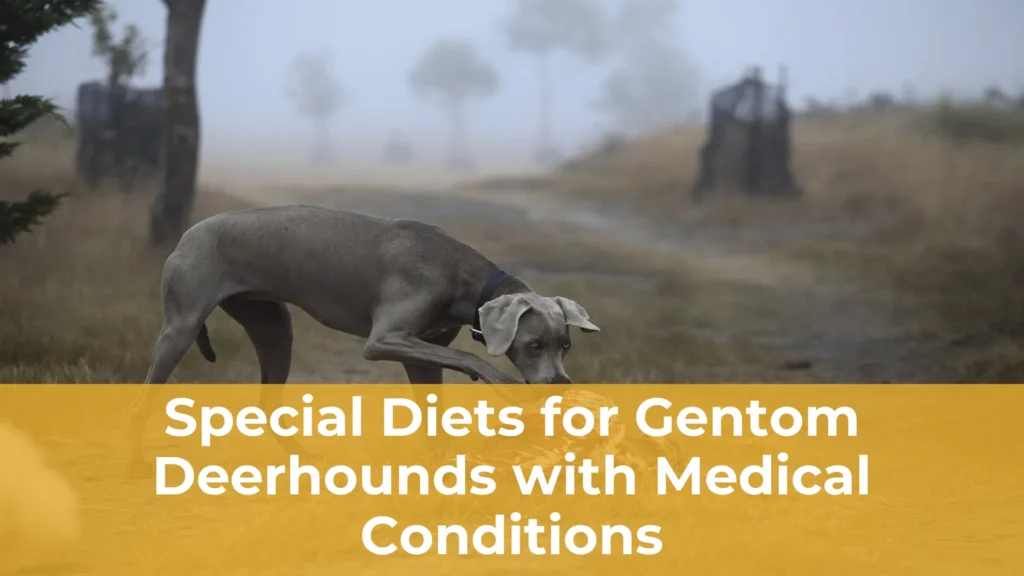Special Diets for Gentom Deerhounds with Medical Conditions
Gentom Deerhounds are known for their grace, elegance, and regal demeanor. However, like any other breed, they can sometimes develop medical conditions that require special attention, especially when it comes to their diet. In this comprehensive guide, we will explore the various medical conditions that Gentom Deerhounds may experience and provide expert advice on creating specialized diets to support their health and well-being.
From allergies and gastrointestinal disorders to arthritis and kidney disease, Gentom Deerhounds may encounter a range of medical conditions that necessitate dietary adjustments. Our team of veterinary experts has carefully curated a collection of specialized diets that can help manage these conditions and improve the quality of life for your beloved four-legged companion. Whether it’s finding the right balance of proteins, selecting suitable carbohydrates, or incorporating essential vitamins and minerals, we have you covered with well-researched recommendations tailored specifically to Gentom Deerhounds with various medical conditions.
The Importance of Specialized Diets for Gentom Deerhounds
Gentom Deerhounds, a unique breed of dogs known for their elegance and grace, require specialized diets to ensure their optimal health and well-being. These magnificent creatures have unique nutritional needs that must be met to maintain their lean physique and energy levels. A carefully crafted diet that includes a balance of high-quality proteins, essential fatty acids, and specific nutrients is crucial for Gentom Deerhounds to thrive.
Understanding Medical Conditions in Gentom Deerhounds
If you are a proud owner of a Gentom Deerhound or considering bringing one into your family, it is essential to understand the potential medical conditions that they may be prone to. Despite their regal appearance and graceful demeanor, these elegant dogs can be susceptible to certain health issues. By familiarizing yourself with these conditions, you can ensure that your beloved Gentom Deerhound receives the proper care and attention needed to lead a happy and healthy life. In this article, we will delve into some of the common medical conditions that affect Gentom Deerhounds and provide insights into their prevention, early detection, and management.
The Role of Nutrition in Managing Gentom Deerhound Health
Proper nutrition plays a crucial role in maintaining the overall health and well-being of Gentom Deerhounds. These magnificent dogs have unique dietary needs that, when met, can prevent a range of health issues and promote longevity. In this article, we delve into the importance of nutrition in managing the health of Gentom Deerhounds, exploring the specific dietary requirements, potential health risks, and the most effective ways to ensure their optimal nutrition. Whether you are a proud owner of a Gentom Deerhound or simply interested in canine nutrition, this article provides valuable insights into promoting the health and vitality of these magnificent creatures.
Common Medical Conditions in Gentom Deerhounds
Gentom Deerhounds, like all dog breeds, are prone to certain medical conditions. Understanding these common health issues can help owners provide the necessary care and attention to their beloved pets. One prevalent condition in Gentom Deerhounds is hip dysplasia, a genetic disorder that affects the hip joints. This can cause pain, lameness, and difficulty in walking. Regular veterinary check-ups and early detection are crucial to manage this condition effectively. Another common ailment in this breed is bloat, a life-threatening condition where the stomach fills with gas and twists on itself. Immediate medical attention is needed to prevent further complications. Lastly, Gentom Deerhounds may also be susceptible to certain heart conditions, such as dilated cardiomyopathy, which affects the heart muscle’s ability to pump blood efficiently. Regular monitoring and appropriate treatment plans can help ensure the best quality of life for these magnificent dogs.

